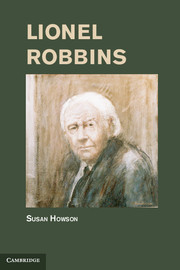Book contents
- Frontmatter
- Contents
- Illustrations
- Abbreviations
- Introduction
- One Father and Son
- Two The Great War
- Three Postwar
- Four The London School of Economics
- Five Iris Gardiner
- Six New College Oxford
- Seven The Young Professor
- Eight Fritz and Lionel
- Nine The School in the Mid-1930s
- Ten The Approach of War
- Eleven The Economics of War
- Twelve Director of the Economic Section
- Thirteen Anglo-American Conversations
- Fourteen The Law Mission and the Steering Committee
- Fifteen 1 9 4 4
- Sixteen The Last Months of the War
- Seventeen The Postwar Settlement
- Eighteen Return to the School
- Nineteen The End of the Transition
- Twenty LSE in the Early 1950s
- Twenty-One Chairman of the National Gallery
- Twenty-two Lord Robbins
- Twenty-three The Robbins Report
- Twenty-four The Sixties
- Twenty-five The Arts
- Twenty-six The Troubles at LSE
- Twenty-seven Retirement
- Conclusion
- Bibliography
- Index
Two - The Great War
Published online by Cambridge University Press: 07 October 2011
- Frontmatter
- Contents
- Illustrations
- Abbreviations
- Introduction
- One Father and Son
- Two The Great War
- Three Postwar
- Four The London School of Economics
- Five Iris Gardiner
- Six New College Oxford
- Seven The Young Professor
- Eight Fritz and Lionel
- Nine The School in the Mid-1930s
- Ten The Approach of War
- Eleven The Economics of War
- Twelve Director of the Economic Section
- Thirteen Anglo-American Conversations
- Fourteen The Law Mission and the Steering Committee
- Fifteen 1 9 4 4
- Sixteen The Last Months of the War
- Seventeen The Postwar Settlement
- Eighteen Return to the School
- Nineteen The End of the Transition
- Twenty LSE in the Early 1950s
- Twenty-One Chairman of the National Gallery
- Twenty-two Lord Robbins
- Twenty-three The Robbins Report
- Twenty-four The Sixties
- Twenty-five The Arts
- Twenty-six The Troubles at LSE
- Twenty-seven Retirement
- Conclusion
- Bibliography
- Index
Summary
To a later generation the events of the summer of 1914 that led to the Great War read as a chapter of bizarre and sinister accidents. On 28 June, Archduke Franz Ferdinand and his wife were assassinated in Sarajevo by a student revolutionary agitating for the separation of Bosnia-Herzegovina from the Austro-Hungarian Empire and union with its eastern neighbour Serbia. After obtaining a guarantee of support from Germany in case Russia actively supported the Serbs, Austria first threatened Serbia, as it had often done before, and then declared war on it on 28 July when the Serbian government had refused to allow Austro-Hungarian troops to enter Serbia in search of conspirators. Serbia had already mobilized its forces; in support of Serbia, Russia ordered general mobilization on 30 July. Germany responded by declaring war on Russia on 1 August, and on Russia’s ally France two days later. Belgium refused a German demand to allow its forces to cross Belgium to get to France; Germany invaded Belgium; and Britain, who had guaranteed Belgian neutrality, declared war on Germany on 4 August. No wonder the outbreak of war ‘came like a bolt from the blue to all [the Robbins] family circle’ (Robbins 1971a, 33).
In August 1914 Lionel Robbins was a fifteen-year-old schoolboy. He was expecting to stay at school for two more years before going to university. As he recalled (ibid., 29 and 35), his only ambition in life was to be ‘an effective poet’ – his father naturally had other ideas – and his early reaction to the war was poetic: ‘I wrote a poetic drama, in the mode of Shelley’s Hellas, entitled Peace Exiled.…I remember getting up very early in the morning to get naturalistic detail for a chorus about sunrise which was to mark the turning-point of the allegoric entity who was the central figure of the action.…’ The earliest surviving poem in his papers is ‘Sunrise, Hymn to Dawn, August 1914’.
- Type
- Chapter
- Information
- Lionel Robbins , pp. 25 - 50Publisher: Cambridge University PressPrint publication year: 2011



